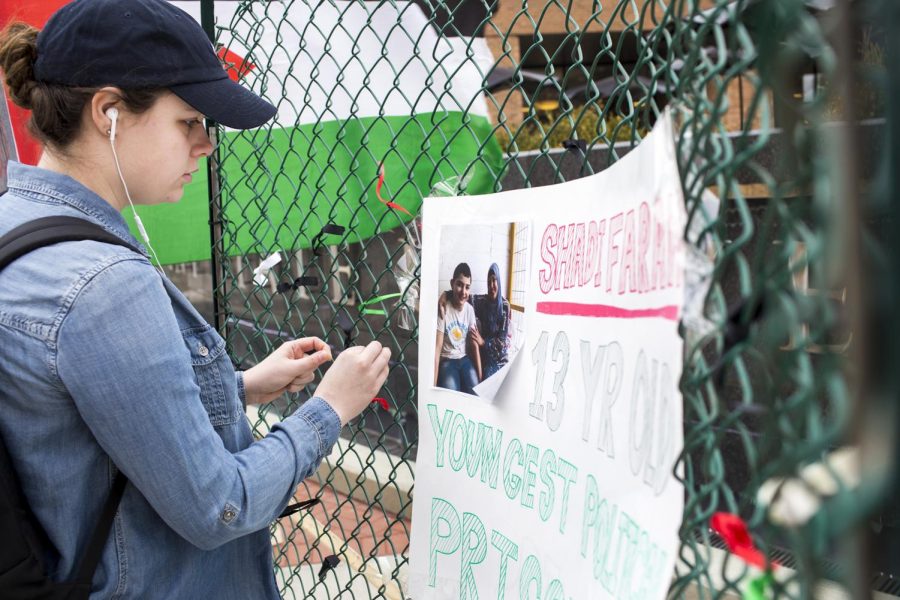SJP holds Israeli Apartheid Week, informs students
March 20, 2017
Starting Monday members of Students for Justice in Palestine (SJP) set up a mock wall on Risman Plaza to represent the current barrier within the West Bank as part of Israeli Apartheid Week.
The Israeli West Bank wall is a separation barrier in the West Bank dividing Israeli and Palestinian land. It was built in 2002 and spans 422 miles, according to Al Jazeera America.
The Israeli purpose of the wall was to protect the Israeli people from Palestinian terrorism, but most Palestinians see the wall as a method of racial segregation. Al Jazeera America‘s article from 2014 states that the wall cut off many Palestinians from their land, hospitals and businesses.
Palestinians must go through checkpoints run by Israel before traveling to another city in the West Bank. Some see this as a method of protection, while others view checkpoints as Israel controlling Palestinian freedom. According to the Israeli Information Center for Human Rights in the Occupied Territories (B’Tselem), as of Jan. 31, there are 98 fixed checkpoints in the West Bank.
Protests for and against the wall occur frequently and worldwide.
Subhi Samad, a senior biology major and member of SJP, said he was happy for the opportunity to inform others of the current Palestinian climate.
“I believe in equal rights for all human beings, and what’s been going on in Israel since 1948 has been an occupation of Palestinian territory,” Samad said. “We’re not here to dispute land, and we’re not here to dispute religion. We’re here to say that what’s going on is a violation of international law, and it’s a violation of human rights.”
Samad said he can personally relate to the Palestinian struggle due to familial ties.
“Both of my parents are refugees who were dispersed in the ’80s out of Nazareth,” Samad said. “It’s hard. You go back and see kids who beg for money in the streets, and you want to do something about it. It’s insane and heartbreaking.”
To represent the apartheid wall, three tall gray planks were covered in symbolic graffiti.
Amanda Michalak, a senior political science major and SJP member, assisted in the design of the mock wall.
“Some of the artwork on the mock wall are actually on the real wall in Palestine,” Michalak said.
In addition to the mock wall, there is also a piece of fence that people can tie bits of ribbon to for Shadi Farah, a 13-year-old boy who is the youngest political prisoner of the Israeli state.
According to the International Solidarity Movement, Farah was arrested with a friend at a bus stop in Jerusalem after a group of East Jerusalem illegal settlers called authorities on suspicion of the boys being Palestinian. During the arrest, Israeli authorities proclaimed the boys had gone to Jerusalem with the intent to stab a soldier and charged them with attempted manslaughter.
After abuse and harsh treatment, the boys admitted to the charges without a lawyer or guardian present. Only one witness spoke of the boys planning an attack while in school.
Despite the odds against him, Farah is still believed to be innocent.
“Shadi Farah’s mother came to talk to SJP a couple weeks ago, and she basically told us about his experience at the justice system and his trial, which wasn’t a fair trial,” Michalak said. “We are tying on ribbons to stand in solidarity with him. He’s about one-third of the way through his three-year term, so he’s kind of at the point where he might be starting to lose hope. We’re trying to keep his family’s spirits as high as we can, given the circumstances.”
The mock wall attracted curious onlookers who asked questions, took pictures or tied a ribbon for Farah.
Noah Kuiken, a freshman psychology major, was drawn in.
“I saw there was something going on, so I thought that if someone was putting up all of this stuff, it must be something serious and something that needs to get out,” Kuiken said. “I feel like stopping and listening is the least I can do.”
Kuiken learned about the Palestinian opinions of the wall.
“I knew basically a little bit about it, but I didn’t know the severity of it. I didn’t know that there was a 13-year-old boy in prison for all of this. This has definitely given me something to go off to do my own research to see what’s going on and see how I can support it,” Kuiken said.
Despite the peaceful efforts made by SJP, there were a few angry people with SJP’s stance on the wall, Samad said.
Samad claimed that some people would “flip them off” or throw graffitied T-shirts at them.
“One girl called us terrorists,” Samad said. “We can’t really get mad because people like this are uninformed. We hope they come up to us and start a conversation instead of being mean.”
The mock wall will be up all week from 11 a.m. to 4 p.m. with SJP members handing out fliers and talking about Palestine’s perspective. Numerous other events are also going on this week as part of Israeli Apartheid Week.
McKenna Corson is a diversity reporter, contact her [email protected].












